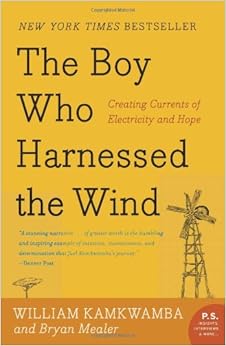
I thought this was a fantastic book and I give it five of five stars! Sometimes nonfiction can be hit or miss; sometimes it's too dense or deep for pleasure reading. The Boy Who Harnessed the Wind was definitely an enjoyable read. I could almost hear the author himself narrating it in my head. It was conversational, well-paced, and never went over my head with information.
The book jacket blurb is a little lengthy, but it really does a good job of describing of the book so I'm going to quote it here rather than trying to sum it up myself: "William Kamkwamba was born in Malawi, a country where magic ruled and modern science was mystery. It was also a land withered by drought and hunger, and a place where hope and opportunity were hard to find. But William had read about windmills in a book called Using Energy, and he dreamed of building one that would bring electricity and water to his village and change his life and the lives of those around him. His neighbors may have mocked him and called him misala-crazy-but William was determined to show them what a little grit and ingenuity could do.
Enchanted by the workings of electricity as a boy, William had a goal to study science at Malawi's top boarding schools. But in 2002, his country was stricken with a famine that left his family's farm devastated and his parents destitute. Unable to pay the eighty-dollar-a-year tuition for his education, William was forced to drop out and help his family forage for food as thousands across the country starved and died.
Yet William refused to let go of his dreams. With nothing more than a fistful of cornmeal in his stomach, a small pile of once-forgotten science textbooks, and an armory of curiosity and determination, he embarked on a daring plan to bring his family a set of luxuries that only two percent of Malawians could afford and what the West considers a necessity-electricity and running water. Using scrap metal, tractor parts, and bicycle halves, William forged a crude yet operable windmill, an unlikely contraption and small miracle that eventually powered four lights, complete with homemade switches and a circuit breaker made from nails and wire. A second machine turned a water pump that could battle the drought and famine that loomed with every season.
Soon, news of William's magesti a mphepo-his "electric wind"-spread beyond the borders of his home, and the boy who was once called crazy became an inspiration to those around the world.
Here is the remarkable story about human inventiveness and its power to overcome crippling adversity. The Boy Who Harnessed the Wind will inspire anyone who doubts the power one individual's ability to change his community and better the lives of those around him."
By the end of the book, I was awestruck at William's determination and motivation. At one point his family and the other families in his village are all literally dying of starvation and yet he doesn't complain. He actively seeks out ways to be helpful to his family, to seek day-work to try to bring home a little food, and to ride his bike to the library to check out science textbooks. Rather than saying that the gods or witches or whoever have cursed the village oh woe is me, he tries to solve the problem and prevent it ever happening again in the future by building a windmill that can pump water to his family's fields. I was getting goosebumps by the end of the book, and it was hard to resist cheering out loud for William!
The Boy Who Harnessed the Wind isn't any longer or more difficult to read than a novel. Go read it and be amazed by this kid.
*I received my copy of The Boy Who Harnessed the Wind from my public library.
No comments:
Post a Comment